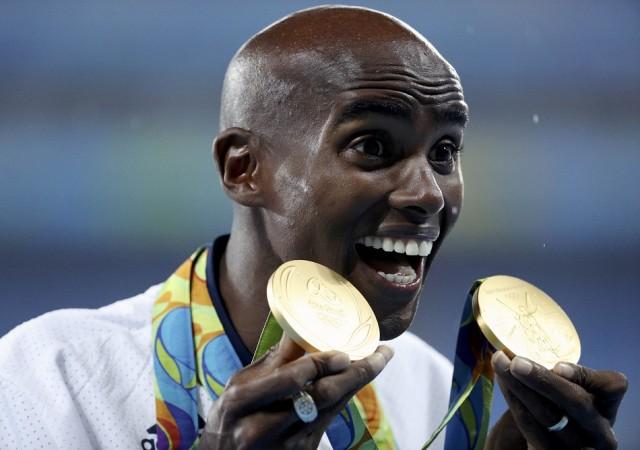
When Mo Farah decides to let those legs of his take flight in the final few metres, there really is nothing anyone can do, not the Ethiopians, not the Kenyans, not the Americans. Farah put on another brilliant show at the Rio Olympics, using that turbo-charged sprint in the final lap of his to clinch the double-double by lifting the 5000m in style.
The man from Great Britain had already taken the gold medal in the 10,000m earlier in Rio 2016, and while he admitted to his legs being tired and recovery not going quite as well as he would have liked, Farah was still more than good enough to take gold in the 5000m, to add to the two titles he won in London 2012.
"I can't believe it," Farah was quoted as saying by The Guardian. "My legs were a bit tired after the 10k – I don't know how I recovered. People were bringing me food in my hotel room.
"But I hate to lose. Even in PE, I hated losing. I have that drive – it's just me. I can't quite believe it. I wished for just one medal as a junior. It has been a long journey, but if you dream of something, have ambitions and are willing to work hard, then you can get your dreams."
It was the stuff made of dreams indeed. Farah became the first man since "The Flying Finn" Lasse Viren did the double-double in the 1972 and 1976 Olympics to clinch the gold medal in the 5000m and 10,000m in two consecutive Games.
For a while, there were doubts that, that might happen, with the race maintaining quite a good pace. Farah was happy to stay at the back at the beginning of the race, before moving to around sixth, waiting for that pounce.
When the bell rang for the final lap, however, the Brit, who had already taken the lead three laps ago, looked in control. And while Hagos Gebrhiwet got ahead of him with about 250 to go, Farah jumped into the lead again before easing home to take the gold in 13:03.30. Paul Kipkemoi Chelimo (13:03.90) of the US crossed the line in second place, with Gebrhiwet (13:04.35) coming through in third. The American was later disqualified for a lane infringement, one of the three who suffered that fate, including fourth-placed Mohammed Ahmed of Canada, but later, that disqualification was declared null and void, giving Chelimo the silver medal, with Gebrhiwet taking the bronze.
"I was surprised by the first lap," Farah added. "I thought it was going to be a slow race. They had a plan, they wanted to take the sting out of me but when I hit the front, I wasn't letting anyone past me."
The women's and men's 4x400m relays that followed were both won by the Americans. The women's team of Courtney Okolo, Natasha Hastings, Phyllis Francis and Allyson Felix comfortably won the gold medal in 3:19.06, with Jamaica (3:20.34) and Great Britain (3:25.88) taking silver and bronze respectively.
Lashawn Merritt ran a fast final leg to give USA the gold in the men's 4x400m relay in a season's best time of 2:57.30, with Jamaica (2:58.16) again taking silver, while the Bahamas (2:58.49) took home the bronze medal.
Caster Semenya justified her favourite's tag in the women's 800m metres, with the South African outclassing her opponents to finish first in 1:55.28. Francine Niyonsaba won the silver, while Margaret Nyairera Wambui settled for bronze.
The men's 1500m title went to America's Matthew Centrowitz, with the Algerian Toufik Makhloufi, the silver medallist in the 800m as well, and Nicholas Willis of New Zealand taking second and third respectively.
Thomas Rohler of Germany won the men's javelin gold, ahead of Julius Yego and Keshorn Walcott, while Spaniard Ruth Beitia took the women's high jump gold medal, with Mirela Demireva and Blanka Vasic lifting silver and bronze.










